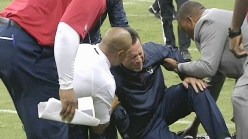Very disturbing videos have been in the news:
They show high school football players assaulting referees because they were unhappy with a call made.
It must be pointed out the young men were ejected, suspended from the team, denounced by their coach and could be facing criminal charges. The consequences for this inexcusable behavior could be very high (as it should be).
My concern is that such behavior does not come out of nowhere. Even though there are rules for sportsmanship, we cannot be terribly surprised that it happens, given the nature of our competitive culture.
Last year a former Major League pitcher was ejected from a baseball game for 10-year- olds after he launched into a profanity laced tirade in front of the children because he didn’t like a call. This started a conversation about winning and motivation. While no one thought it was okay to swear in front of kids, some adults conceded that they admired his passion to win.
olds after he launched into a profanity laced tirade in front of the children because he didn’t like a call. This started a conversation about winning and motivation. While no one thought it was okay to swear in front of kids, some adults conceded that they admired his passion to win.
One friend admitted that he was less concerned about the former player’s loud and foul mouth than about how children today are no longer taught to win but are instead led to believe that “everyone is a winner” no matter what the outcome of a contest. He was agitated by what he saw as a growing trend to make children less competitive  and more willing to accept failure.
and more willing to accept failure.
“We are not instilling the values and motivations required to become successful and are creating an America that can no longer call itself exceptional,” were his words.
On a certain level, I agreed. I don’t believe we are consistently instilling the values and motivations required to become successful. Where I disagree is with the kind of values and motivations that create success. I believe that the “Winning is Everything” mentality is taking over not only sports, but education and politics, as well, and my observation is that it is actually corroding our once productive culture.
NFL Player, James Harrison, sparked controversy for returning trophies that were given to his children for participation in a sport’s camp. His post to Instagram read: “I came home to find out that my boys received two trophies for nothing, participation trophies! While I am very proud of my boys for everything they do and will encourage them till the day I die, these trophies will be given back until they EARN a real trophy…”
I understand his statement and his words received a lot of praise in circles in which I participate. My own sons have been involved in organized sports and I have heard this said many times before. Many parents are opposed to the idea that competition doesn’t have to be a “winner takes all” endeavor and they don’t accept that mere participation can be an experience to build character, self-esteem and a willingness to try.
I contend that Harrison’s position is not an accurate assessment of achievement. There is evidence that the fierce mentality of sport-like competition is devaluing compassion, sensitivit y and creativity. We are too often replacing the education model that understood that children are different and learn at their own pace, with a constant monitoring of progress and an endless cycle of comparison that impatiently demands winning results.
y and creativity. We are too often replacing the education model that understood that children are different and learn at their own pace, with a constant monitoring of progress and an endless cycle of comparison that impatiently demands winning results.
This winning-is-everything culture is raising blood pressure, making us less patient, creating anger and dissatisfaction and is demoralizing capable children by comparing them to those who are the strongest or the most resilient.
That intensity may be what is required to play in the NFL, but most of us don’t run into 300 pound linemen and pull 60 G’s with 1600 pounds of tackle force to make a living.
 More compelling is the fact that three NFL coaches collapsed from heart conditions in the past two seasons and it isn’t hard to surmise that the stress surrounding the expectation to win, and the intensity that follows that directive, is putting cardio vascular systems through the wringer.
More compelling is the fact that three NFL coaches collapsed from heart conditions in the past two seasons and it isn’t hard to surmise that the stress surrounding the expectation to win, and the intensity that follows that directive, is putting cardio vascular systems through the wringer.
Recently, I witnessed a boy, probably 8 years old, fall during an athletic activity at his school. Not a serious fall or injury, but he cried like it hurt. The coach’s response was, “Man up! We play through pain!”
The young man perked right up and went back to the game. Admittedly, gender stereotyping aside, I wasn’t up in arms at that moment, but it contributed to my growing awareness of the message we are sending to our children: Pain is for losers.
I work with a number of creative and highly intelligent people and they don’t respond to sports analogies, competiveness and constant challenges to be tougher. Many of them have the temperament of scientists or artists with calmer dispositions and resist competition to leave room for the discoveries that come from patience and even failures. They are not encouraged by motivation-to-win techniques, but by acceptance of their gentler idiosyncrasies.
They may not exceed sales goals and increase margins but they may be the ones who will move the needle of invention that a company, or a school, or a nation will prosper from.
A parent called his son a “whiny, little brat” for complaining too often and too loudly about one of those things that teenagers complain about too often and too loudly. The words echoed the mentality that success is determined by toughness and that feelings are just so much whining.
often and too loudly about one of those things that teenagers complain about too often and too loudly. The words echoed the mentality that success is determined by toughness and that feelings are just so much whining.
The boy was hurt, but was not allowed to be, and that could leave an imprint that causes him to cauterize his feelings in the future, resulting in having less patience for others. It could be what stops his heart in the middle of a game because he was so ![]() stressed over what he could not control.
stressed over what he could not control.
The social psychophysiological truth is that it’s also “okay” to hurt, and unless we make that an option and not an evaluation of how manly or tough our children are, we are going to instill more dissatisfaction, more anger and see more violent behavior.
The kid at camp that came in 5th in the Bean Bag Race probably deserved his ribbon simply for finishing the race. His accomplishment may even be as rewarding to him as it was to the kid who came in first. And maybe he will come to the realization that bean bag racing is not where his future lies. Maybe he’ll, instead, go into science and maybe he’ll find the cure for cancer.
Or maybe not…maybe he will toil for the rest of his life trying to improve his hopping skills. But, I assure you, his chance for success will not have been diminished because a compassionate society once rewarded an effort where he lost, but tried.
skills. But, I assure you, his chance for success will not have been diminished because a compassionate society once rewarded an effort where he lost, but tried.
And we can be sure that he’s not being programmed for the anger that spears a referee after a bad call.